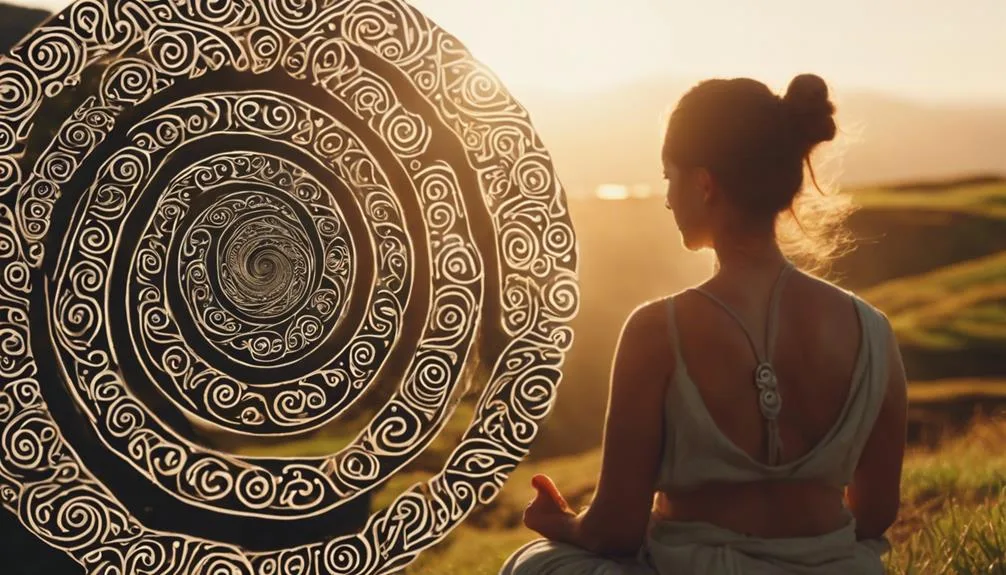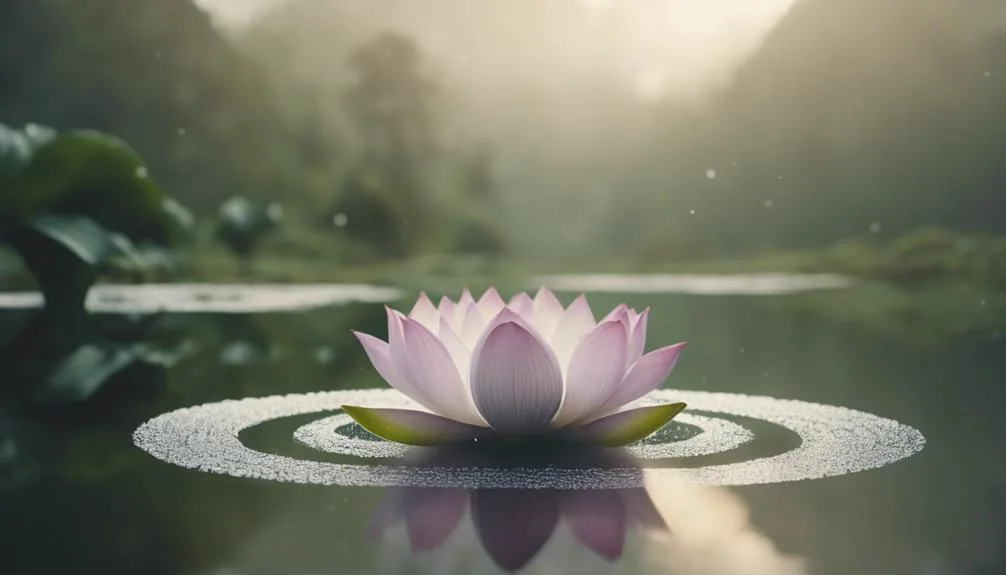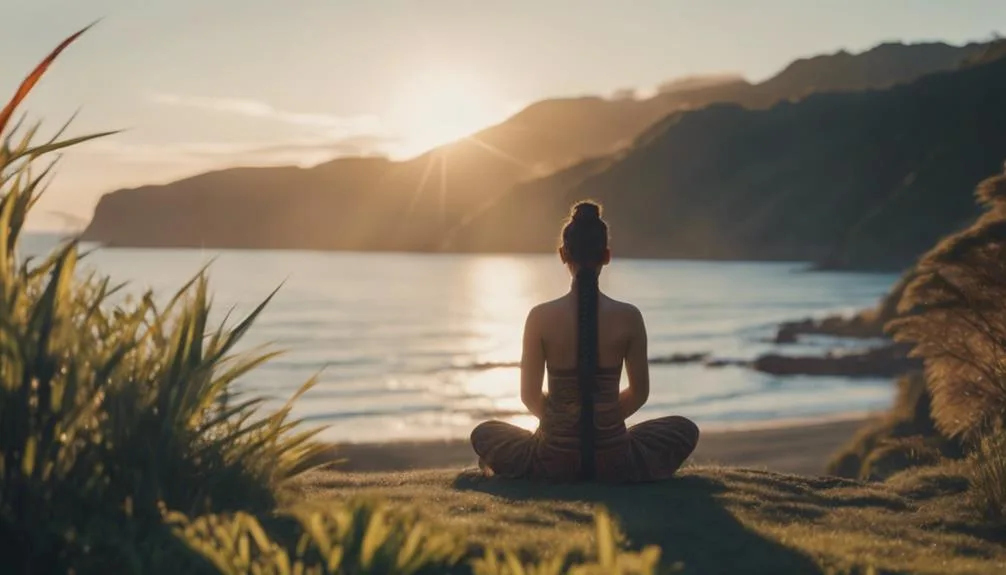In a world where the fast pace of life often leads us to lose touch with our roots, you may find solace in the gentle embrace of ancient practices.
Mindfulness and Maori spiritual traditions offer more than just a pause from the hustle; they present a unique blend that bridges cultural and spiritual realms.
By exploring this intersection, you're invited to uncover how these practices not only complement each other but also provide a pathway to deeper understanding and healing.
What lies at the heart of this synergy might just offer the solace you've been seeking, beckoning a closer look at its transformative potential.
Key Takeaways
- Integrating Maori spirituality with mindfulness enhances holistic well-being by aligning mind, body, spirit, and nature.
- Maori rituals and nature practices offer pathways to deeper self-awareness and emotional regulation through present moment awareness.
- Cultural and spiritual practices foster a balanced existence, emphasizing the importance of environmental and interpersonal relationships in overall health.
- Reflecting on and engaging with Maori deities and natural landscapes promotes inner peace and a compassionate relationship with oneself and the environment.
Understanding Maori Traditions
To truly grasp Maori traditions, one must delve into the interconnected realms of their Atua, or Gods, which embody the essence of both the spiritual and natural worlds. These traditions aren't merely rituals; they're the pathways to understanding life's cycles and our place within them. The Maori spiritual practices, deeply rooted in the teachings of Rangi Nui, Papatuānuku, and Tāne Mahuta, offer a unique perspective on mindfulness, emphasizing the significance of connecting with Te Ao Wairua and Te Ao Turoa.
You'll find that each Atua serves as a guide for different aspects of life, including reflection, tranquillity, protection, and revitalizing the spirit. Engaging in practices like walking barefoot to connect with Papatuānuku or immersing oneself in the waters associated with Tangaroa, you're not just performing an act; you're participating in a deeply spiritual process of healing and connection. These actions are central to Maori mindfulness practices, highlighting the importance of nature, reflection, and spiritual nourishment in achieving holistic well-being. Understanding these traditions offers a profound insight into a lifestyle where every practice is an opportunity for mindfulness and spiritual growth.
The Essence of Mindfulness
Understanding Maori traditions enriches our perspective on mindfulness, emphasizing the importance of present moment awareness and a non-judgmental acceptance of our internal landscapes. Mindfulness, at its core, invites you to immerse yourself fully in the here and now, engaging deeply with your thoughts, emotions, and the sensations that paint your current experience. This practice, rooted in ancient wisdom yet universally adaptable, champions the cultivation of self-awareness, allowing you to navigate life's ups and downs with grace and resilience.
By practicing mindfulness through meditation, deep breathing, or body scans, you embark on a journey toward inner peace and clarity. This isn't just about quieting the mind; it's about understanding and accepting yourself more fully, fostering a compassionate relationship with your inner world. The essence of mindfulness lies not only in personal tranquility but in recognizing our interconnectedness with the world around us.
Scientifically proven to alleviate stress and anxiety, mindfulness enhances your mental well-being, equipping you with the tools to approach life's challenges with a balanced and open heart. It's a transformative process that enriches your life, offering a path to profound self-awareness and a deeper, more meaningful engagement with the world.
Maori Concepts of Wholeness

Exploring Maori concepts of wholeness unveils a profound interconnectedness among mind, body, spirit, and environment, advocating for a balanced and harmonious existence. In Maori traditions, this sense of wholeness isn't just an ideal; it's a way of life, where achieving balance and harmony in all aspects of life is paramount. This holistic approach to health is deeply rooted in the understanding that wellness stems from a state of equilibrium, not just within oneself but also in alignment with nature and ancestors.
The Maori view of wholeness goes beyond the physical, embracing emotional and spiritual well-being as integral components of holistic health. It's a perspective that sees the individual not as an isolated entity, but as part of a larger, interconnected web of life. This interconnectedness suggests that our health is influenced by our relationships with others, our environment, and even our past generations.
Modern Mindfulness Techniques
You've learned how traditional practices can ground and connect us, and now it's time to explore how modern mindfulness techniques, specifically simplified breathing techniques and the benefits of a digital detox, can enhance your mental well-being.
By integrating these practices into your daily routine, you're not just reducing stress; you're actively cultivating a more present, aware state of mind.
This holistic approach empowers you to observe your thoughts and feelings without judgment, leading to profound emotional regulation and psychological health improvements.
Breathing Techniques Simplified
Breathing techniques in modern mindfulness practices offer a simple yet powerful way to enhance your awareness and alleviate stress. By focusing on your breath, you're not just engaging in a practice rooted in mindfulness; you're also connecting with cultural practices that have understood the importance of breath for centuries. Deep breathing exercises, a cornerstone of these techniques, aren't only about calming your mind. They're about regulating your emotions, sharpening your concentration, and inviting relaxation into your moment.
Incorporating these breathing techniques into your daily routine is a practical step towards nurturing your well-being and mental clarity. It's a holistic approach that acknowledges the complexity of human emotions and the simplicity of breath as a tool for managing them. Through mindful breathing, you're empowered to navigate daily stressors with a sense of calm and presence.
Digital Detox Benefits
Have you ever considered how a digital detox might significantly enhance your mindfulness and overall mental well-being? Reducing screen time not only improves your mental health but also bolsters your ability to remain present and connected with your surroundings.
By disconnecting from digital devices, you're taking a pivotal step toward cultivating a deeper sense of mindfulness, allowing you to engage more fully with life's moments. Research underscores the link between excessive screen time and heightened stress, alongside diminished productivity.
Incorporating digital detox activities, such as nature walks or meditation, supports your overall health. Moreover, regular digital detox practices are known to foster better sleep and lower anxiety levels, promoting a healthier, more mindful lifestyle.
Cultural Synergies Explored

Exploring the cultural synergies between Maori spiritual practices and mindfulness reveals a deeply interconnected approach to well-being and spiritual connectivity. At the heart of this alignment are shared cultural values, an emphasis on traditional healing, and a profound spiritual connection that transcends physical boundaries.
Maori mindfulness practices, deeply rooted in the domains of specific Atua or Gods, offer more than just a method for achieving personal tranquility. They embody a holistic worldview that integrates the physical, spiritual, and mental aspects of health. Rangi Nui, for example, symbolizes reflection and tranquility, encouraging introspection and stillness that resonate with the core principles of mindfulness. Similarly, walking barefoot on the land, under the protection of Papatuānuku, fosters a unique sense of connection and protection, echoing mindfulness's emphasis on being present and grounded.
Furthermore, the peacefulness offered by Tāne Mahuta's domain and the cleansing practices associated with Tangaroa highlight the importance of nature in achieving mental and spiritual well-being. These practices not only promote individual harmony but also underscore a collective responsibility to maintain balance within the environment, thereby enriching the spiritual connection shared by all living beings.
Nature and Spirituality
Reflecting on the cultural synergies discussed, it's clear that the essence of Maori spiritual practices and their connection to nature offer profound pathways to spirituality and well-being.
You've probably experienced moments of peace and renewal in nature, but Maori spiritual practices take this connection to a deeper level. They don't merely view nature as a backdrop for spiritual activities; they see it as a living, breathing entity that's integral to their well-being. This holistic view fosters a unique bond between the self and the environment, encouraging a nurturing relationship that benefits both.
| Element | Significance in Maori Spiritual Practices |
|---|---|
| Papatuānuku (Earth Mother) | Walking barefoot for protection and connection |
| Tangaroa (God of the Sea) | Cleansing the spirit, mind, and body through water |
| Tāne Mahuta (God of the Forest) | Providing peace and energy from the bush |
| Rangi Nui (Sky Father) | Fostering reflection and tranquillity |
| Natural Landscapes (Hills, Mountains, Sea) | Filling the spirit and strengthening the body |
Through these practices, you're invited to witness how spirituality and nature intertwine, offering pathways to not only understand but also embody this sacred connection. It's a reminder that the journey to inner peace and well-being is deeply rooted in the embrace of the natural world.
Practices for Inner Peace

In seeking inner peace, engaging with Maori spiritual practices can guide you toward a profound connection with the natural world, enriching your emotional and spiritual well-being. These practices, centered around Atua like Rangi Nui, Papatuānuku, and Tāne Mahuta, offer you a pathway to tranquility by fostering deep connections with the environment.
Walking barefoot on the earth or immersing yourself in water channels the energy of Papatuānuku and Tangaroa, promoting spiritual nourishment and balance. This not only soothes your spirit but aligns you with the rhythms of nature.
Reflecting on the beauty within Tāne Mahuta's realm strengthens both your spirit and body, nurturing a sense of tranquility and unity. Maori mindfulness practices are holistic, aiming to achieve emotional, spiritual, physical, and mental balance. They encourage wellness and healing on all levels, guiding you to a state of inner peace that resonates deeply with the essence of being.
Taking time for reflection under the vastness of Rangi Nui or meditating amidst the lushness of Tāne Mahuta's world are essential practices. These moments of mindfulness lead to greater awareness and flourishing in life, bridging your inner and outer worlds through the wisdom of Maori spiritual practices.
Bridging Spiritual Gaps
You'll find that understanding Maori beliefs sheds light on how mindfulness can be woven into the fabric of modern life, offering a bridge between ancient wisdom and contemporary practices.
Integrating Maori spiritual practices with mindfulness not only enriches your spiritual journey but also facilitates a deeper cultural and environmental connection.
This fusion promotes a holistic well-being, aligning your inner peace with the rhythms of the natural world and fostering a profound sense of belonging and balance.
Understanding Maori Beliefs
Delving into Maori beliefs reveals a profound connection between the spiritual and natural worlds, bridging gaps that often exist in contemporary spirituality. You'll find that Te Ao Wairua and Te Ao Turoa are central, reflecting a deep intertwining of spirit and nature. Rangi Nui, symbolizing tranquility, plays a crucial role in fostering reflection.
| Concept | Significance |
|---|---|
| Te Ao Wairua | Connects individuals to the spiritual realm, enriching life. |
| Te Ao Turoa | Highlights the bond with the natural world, promoting harmony. |
| Rangi Nui | Encourages tranquility and reflection. |
| Papatuānuku & Tāne Mahuta | Revered for nurturing and energizing the spirit, respectively. |
Understanding these elements offers a holistic approach to spirituality, encouraging you to explore and respect these connections for a more fulfilling experience.
Mindfulness in Modern Life
Exploring Māori beliefs uncovers a rich tapestry of spiritual and natural connections, and it's through mindfulness in modern life that we can bridge these spiritual gaps, fostering a deeper sense of awareness and interconnectedness.
Incorporating Māori spiritual practices into mindfulness not only enhances cultural relevance but also connects us to Te Ao Wairua, the Māori spiritual realm. This alignment with Māori values of reflection, tranquility, and spiritual nourishment enriches our modern mindfulness practices.
It aids in recognizing the beauty and significance of nature, reflecting Māori beliefs in the interconnectedness of all things. Through this integration, mindfulness in modern life supports holistic well-being and balance, offering a path to navigate the complexities of a changing world with grace and understanding.
Cultural Spiritual Integration
Integrating Māori spiritual practices with mindfulness offers a unique pathway to bridge the cultural and spiritual gaps many experience in today's interconnected world. Here's how:
- Rongoā Māori Healing: Aligns the spiritual connection to nature with mindfulness, fostering well-being.
- Cultural Identity Enhancement: Incorporating Māori beliefs in mindfulness practices strengthens cultural identity.
- Spiritual Connection with Atua: Mindfulness helps recognize and honor Māori Gods, promoting spiritual balance.
- Tranquility and Reflection: The integration fosters deep tranquility, aiding in spiritual nourishment and reflection.
Future Paths of Integration
The potential for blending mindfulness practices with Maori spiritual traditions offers a rich pathway towards fostering holistic well-being and cultural resonance. As you look towards the future, it's clear that integrating Maori spiritual practices with mindfulness isn't just beneficial; it's essential for promoting a deeper sense of connection and well-being within the Maori community. The collaboration between mindfulness experts and Maori spiritual leaders is key to this integration process. It's a synergy that can unlock unique approaches to wellness that honor both the universal principles of mindfulness and the distinct cultural values of the Maori people.
Incorporating Maori cultural values and principles into mindfulness programs can significantly deepen their connection and relevance. It's not just about adding Maori elements into existing frameworks but tailoring mindfulness interventions to align seamlessly with Maori spiritual practices. This tailored approach fosters a holistic model of well-being that resonates on a deeper level with individuals, promoting healing, cultural identity, and overall wellness. The path forward involves a thoughtful blend of knowledge, respect, and shared goals, paving the way for a future where mindfulness and Maori spiritual practices are intertwined, offering a powerful tool for personal and community transformation.
Frequently Asked Questions
What Is a Maori Perspective to Mindfulness?
A Maori perspective to mindfulness integrates whakapapa understanding, emphasizing your connection to ancestors, taonga guardianship highlighting your role in protecting treasures, and marae connection, fostering community bonds. It's a holistic, empathetic approach to spiritual wellness.
Which Cultures Practice Mindfulness?
You'll find mindfulness in various cultures, rooted in Buddhist origins, weaving through yoga integration, to modern adaptations. It's a practice that spans globally, touching hearts with its holistic, empathetic approach to well-being.
What Is the Connection Between Mindfulness Practices and Living Well?
Mindfulness practices enhance your life by offering health benefits, stress reduction, and personal growth. They help you achieve balance, fostering a holistic approach to well-being that nurtures mind, body, and spirit.
Did Native Americans Meditate?
Yes, Native Americans embarked on spiritual journeys, utilizing meditation within native ceremonies to deepen ancestral connections. This practice fostered a holistic well-being, blending empathy and analysis to navigate life's tapestry.
Conclusion
By weaving the rich tapestry of Maori traditions with the calming threads of mindfulness, we're stitching a quilt of tranquility that wraps around the soul, offering warmth and healing.
This fusion not only bridges spiritual gaps but plants seeds of wholeness in hearts, allowing us to grow roots deep within our cultural and personal identities.
As these practices intertwine, they light a path forward, promising a future where unity and peace flourish.
Together, we're crafting a sanctuary for the spirit, nurturing inner peace and fostering a profound connection with the essence of who we truly are.

